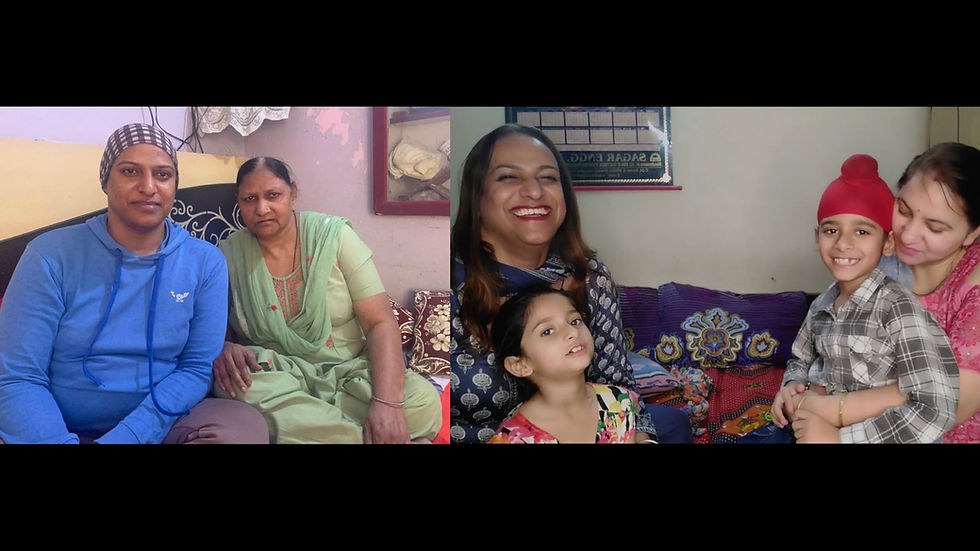'I Am Sirat' LFF 2023 Review: A Love Story
- Anainah Dalal
- Nov 16, 2023
- 5 min read

Once a movie is finished, the common practice is to get up and leave as the credits roll. Of course, if you’re someone who religiously watches Marvel movies, you know there’s nothing that’ll get you shamed more than leaving a cinema hall before the credits finish. And while I’m not as invested in Marvel, I do find myself staying back to watch credits roll as audiences filter out. Sometimes it is to listen to the music, sometimes to let the film I’ve watched sink in, and sometimes just to see if I can play a self-invented game of ‘Find the South Asian’ in the crew. Yet, when I left the afternoon show of I am Sirat I had gone to watch, the end-credit dedication managed to push me over the emotional ledge the movie brought me to the entire time. “This one is for our mothers.” A hugely popular dedication, but put it in context of I am Sirat and her story with her family and society, it is enough to make a moderately well emotionally regulated person (yours truly) sob full, fat tears in broad daylight.
Released on the 14th of September and having premiered at the Toronto International Film Festival, I am Sirat is the deeply emotional and touching story of Sirat Taneja, a trans Punjabi woman living and working in New Delhi, India. Directed by Deepa Mehta and Sirat, the docu-film follows the latter as she goes about her life and converses with the myriad of people that she interacts with on a daily basis, at times using a conventional interview pattern with Mehta, but also including Sirat’s own footage of herself, shot on her phone. We see discussions of trans-identity and acceptance, familial responsibility and the simple joys of being queer emerge through the film, with Sirat as the main focus that pulls us in and keeps us by her side throughout.
The film opens with Sirat having her autorickshaw stop at the side of a road to change into a dress as she converses with the driver- who is also holding Sirat’s phone, recording her- we see the absence of fear and a wholeheartedly trusting attitude towards her society emanate from her. She says “Don’t worry, I’m a girl too” while half undressed as the driver warns her that a girl is approaching, a line that in the opening scene dismisses any notions of transphobia the film *or* its audience could bring. Sirat *is*, was and always will be a woman, facts she is transparent about throughout the film as she discusses her sexuality, gender expression, job, hobbies, friendships and relationship with her mother. With scenes switching between footage shot by herself on her phone and Mehta’s interviews and clips of Sirat, we get an intimate and meticulously constructed insight into her life; the degrees of closeness and intimacy are varied and yet never phoney or pretentious.
Interestingly enough, it is Sirat’s life in her mother’s house and daily personal routine we see through her eyes- her phone. She films herself washing her face, getting ready for the day, cooking, eating, and talking with her mother, spaces we don’t see Mehta enter until the very end. This allows us to look at the boundaries and doubleness of the life she lives but also the immense power and control she holds over it. No one is allowed to see her pre-transition unless she deems it so, a poignant statement that not only depicts her sureness of self but also explains her initial presentation as a man around her mother.
For queer South Asians, familial acceptance and being who we truly, free and unashamedly are, mostly come in stark contradiction to one another. If one does in fact become comfortable with their own identity and loves themselves, more often than not, there hides a fear of society finding out- “log kya kahenge”- “what will people say”. Yet, that does not mean the queer South Asian community is as small, stunted and within the shadows as is portrayed by popular media or even sentiment. There flourishes queer joy in the smallest of South Asian alleyways, and Sirat is the embodiment of that joy. Sirat’s jovial and bubbly personality, always with a large smile and funny joke, is seen in her interactions with her co-workers, fellow queer friends and Mehta primarily, but also in her equally endearing Instagram reels. She talks of her struggles no doubt- having endured physical abuse from her relatives, disconnect with her community and the mental trauma that comes with being rejected by those who love you the most. However, Sirat shows us how she comes to terms with those experiences and feelings, learning to find happiness and love in the smallest of places.
A particularly poignant scene in the film is when she takes Mehta to meet a fellow “sister” who had just undergone gender-affirming surgery. In their interaction, we see Sirat’s friend speaking about her experience of being trans in New Delhi, and how her troubles as a trans woman do not arise from her home or family, but rather the hijra community that hires her. Sirat too explains how she was employed by them, but left due to pressure of choosing between the community and her mother. Not seeming disparaging in any way, yet critical of the sacrifices that are required of them, both Sirat and her friend talk of finding different forms of community and love. This interaction also includes Sirat’s friend's younger sister and mother, both of whose love and respect for both women is transparent. And while we may not see love for trans women like them from society, we definitely see respect from a certain section of that society in instances where people are seen touching Sirat’s feet at a temple and asking for her blessing. “Transgender people are considered auspicious here” she explains, a stark contrast to the vitriol and hate that is also seen towards the trans community within Indian society. Such a dichotomy in the treatment of trans people reflects the duality and struggles of their lives, and with Sirat we see a portrait of what it means to be queer in modern day New Delhi.
Sirat’s story has many powerful moments of self-acceptance and dealing with hatred, and the brightest of those moments is when she claims that she would undergo gender affirming surgery, and while she would accept any resistance from her mother, she was also going to wait till the day she was accepted and brought into her arms again. Because, as in the words of many, “A mother is a mother. And her child is her child.” This unconditional love we see in Sirat, for a mother who has repeatedly rejected her and forces her to live an untruthful life, is admirable- a love that is not expected of most, but is the reality of many queer South Asians. Sirat shows us that wanting love from your parent as your authentic self shouldn’t have to be a struggle, but neither should it be completely disregarded. And it is this insistence on living her truth and yet never giving up on her mother that makes Sirat and her story so resonant to me, as I’m sure it could be for many other queer South Asians.
So at the end, when a dedication was made to mothers, I could not help but think of all the queer children who have lost that love but hope that it is not forever. I am Sirat is a beautiful, authentic and raw portrayal of Sirat’s life and the love she harbours for herself as she sets sail to inhabit the spaces around her- a true love story if there ever was one.
Edited by Martha Knox, Co-Film & TV Editor

































Kommentare